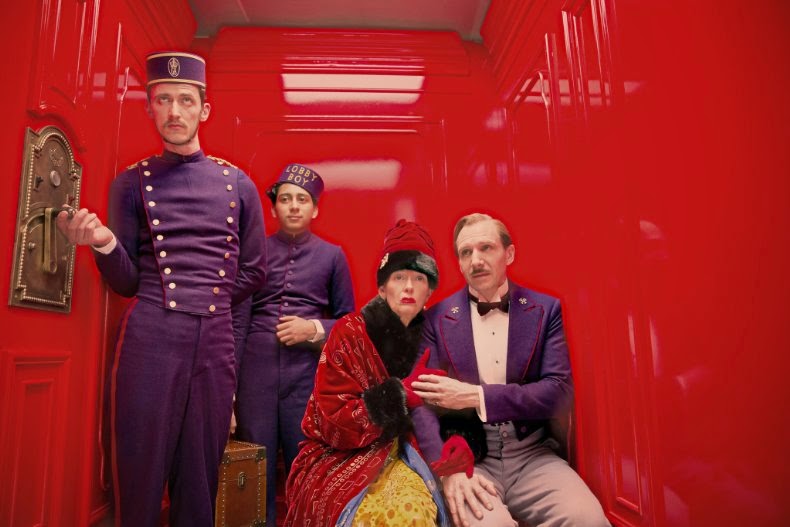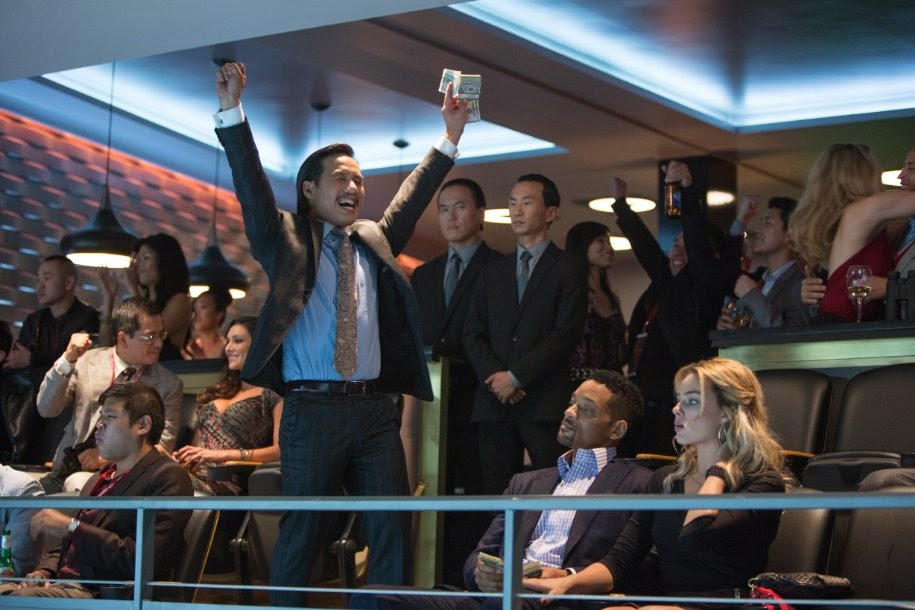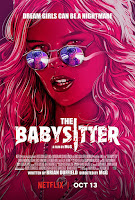The Grand Budapest Hotel
The Grand Budapest Hotel
(2014)
A Review by Grant Kanigan
Directed by: Wes Anderson
Written by: Wes Anderson & Hugo Guinness,
Inspired by Stefan Zweig's writings
Inspired by Stefan Zweig's writings
Starring: Ralph Fiennes, F. Murray Abraham,
Tony Revolori, Edward Norton,
Harvey Keitel
Rating: 14A
Release Date: March 14, 2014
 |
| Paul Schlase, Tony Revolori, Tilda Swinton & Ralph Fiennes in The Grand Budapest Hotel © 2013 - Fox Searchlight |
Wes Anderson has always been an interesting filmmaker. Exploding onto the cinematic landscape with 1994's Bottle Rocket, Anderson has quickly made a name for himself as an auteur. Swinging from sublime to stupid, Anderson has had as many hits as he has misses. For every Moonrise Kingdom, or Royal Tenenbaums, he's also had style-over-substance misfires like the boring Darjeeling Limited or the atrociously mishandled Fantastic Mr. Fox. Still, even Anderson's less than ideal misfires are worlds better than the majority of his colleagues. With Moonrise Kingdom Anderson had nearly perfected his style - capturing the innocence of childhood, the danger of maturity and the classic nature of storytelling. Yet, he finally achieves cinematic nirvana with his latest, The Grand Budapest Hotel. Mixing fragmented storytelling with a linear plot, brilliant visuals with dark landscapes and quirky artistic shots with dark, cynical situations makes for Anderson's best film by far, and one of the cinematic highlights of 2014.
Beginning with a modern day author, (Tom Wilkinson), flashing back to himself as an eager young Writer, (Jude Law), we enter a decrepit, yet still historically significant hotel. Virtually absent of tenants, the young Writer is amazed to find a long time employee of the hotel, who jovially reminisces about the old days - slowly being killed off by convenience and greed. The old man, Mr. Moustafa, (the criminally underrated F. Murray Abraham), begins to recount his days as an intern in the Hotel, back when it was called the Grand Budapest, and when he was known simply by the moniker 'Zero.' In the wonder years of the hotel, it was run by the eccentric, promiscuous and ridiculous M. Gustave, (Ralph Fiennes), who lived to serve, and to make old women feel loved. His love for the elderly soon lands him in trouble when long-time customer, Madame D. (Tilda Swinton), leaves her most prized possession to Gustave following her untimely demise. Upon the reading of her will, the devious members of the Madame's family soon begin to plot against Gustav in order to kill him off and take Madame's fortune for themselves. With the help of young Zero, (Tony Revolori), Gustav is on the run from psycho-killers, greedy family members and the police. With only the trust of his hotel staff and the young Zero, Gustav must travel across a hostile late 1930's Europe in order to prove his innocence and take a fortune which is rightly his.
At face value, the premise sounds a little quirky, and doesn't seem to offer much intellectual meat to whet the average viewer's appetite. Upon further inspection, however, the film has a multitude of metaphors and witticisms to offer. The storyline, which reaches from Alps to prisons, to dark lit street corners, and finally a gargantuan, beautifully constructed hotel is chock full of classic characters; the young hero, star crossed lovers, an old hero, blind to his hubris, a villain who chooses greed over family, and a wise prisoner. Its scope and execution are Shakespearean in their presentation; along with the fate of the characters - Anderson's choice to end his film as a tragedy within the epilogue is a daring choice, and gives the film a heft it wouldn't have otherwise.
As well, the set design is absolutely beautiful. Nothing as complex, interesting or unique has been seen on celluloid since the days of Kubrick's most inventive films. Anderson is a master of set design, and The Grand Budapest Hotel is his masterpiece. Additionally, the makeup throughout - Tilda Swinton's aged Madame, Willem Dafoe's demonic Jopling and Saoirse Ronan's scarred Agatha are all constructed with skill and precision. Not only is the set-design, make-up and costuming revolutionary, the ensemble filling them out are at the top of their game. F. Murray Abraham, Adrien Brody, Jeff Goldblum, Harvey Keitel, Edward Norton and Jude Law all add their own unique perspectives to their roles, and are wholly memorable, even when quite a few are only on screen for one or two scenes. It's a testament to Anderson that he's able to pull such a large cast of wonderfully talented actors into one, fantastic film.
In closing, Anderson has finally hit his stride as an auteur. With the cherubic and innocent Moonrise Kingdom he tapped into a nostalgia that all emotionally aware humans enjoyed. With The Grand Budapest Hotel, he tackled larger themes, like love, loss, hate, fascism, injustice and the importance of tradition as well as the art of storytelling. His darker themes, too, make Budapest the most accessible film within his filmography; standing as one of the best films of the year, The Grand Budapest Hotel is the finest work in Anderson's varied canon, and required viewing for anyone who still finds wonder at the cinema.
Grant's Rating: 5/5 Stars
The Grand Budapest Hotel clip: "He's a Concierge"



Comments